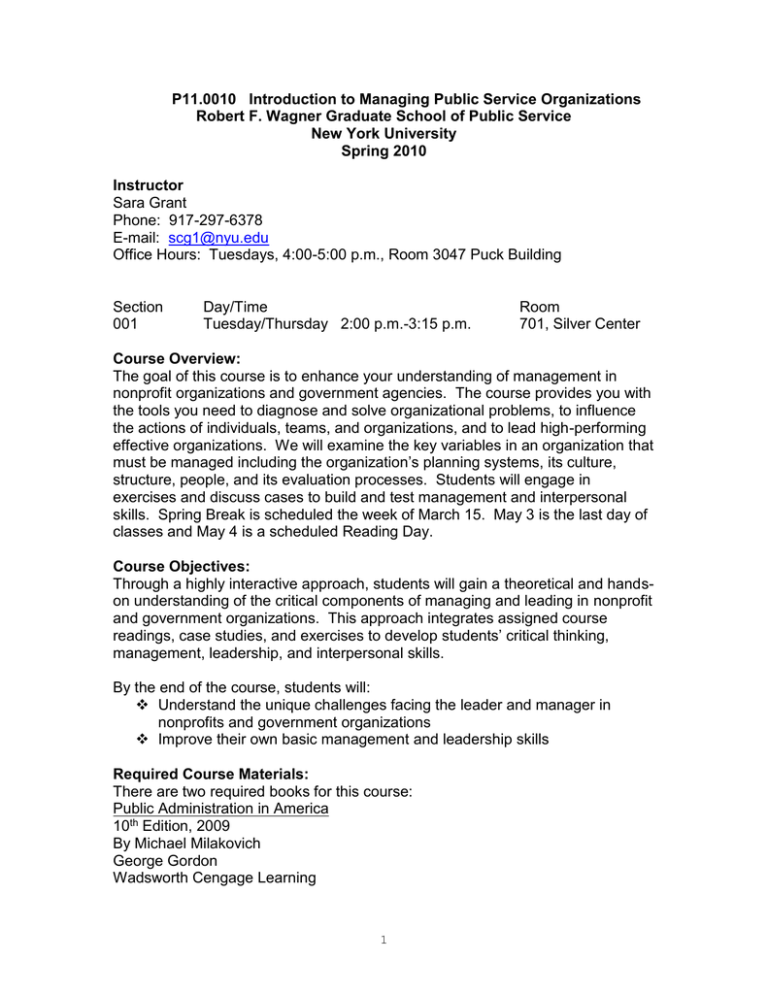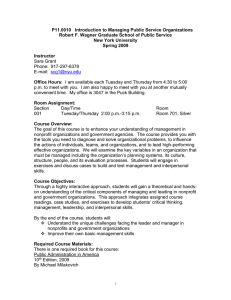P11.0010 Introduction to Managing Public Service Organizations
advertisement

P11.0010 Introduction to Managing Public Service Organizations Robert F. Wagner Graduate School of Public Service New York University Spring 2010 Instructor Sara Grant Phone: 917-297-6378 E-mail: scg1@nyu.edu Office Hours: Tuesdays, 4:00-5:00 p.m., Room 3047 Puck Building Section 001 Day/Time Tuesday/Thursday 2:00 p.m.-3:15 p.m. Room 701, Silver Center Course Overview: The goal of this course is to enhance your understanding of management in nonprofit organizations and government agencies. The course provides you with the tools you need to diagnose and solve organizational problems, to influence the actions of individuals, teams, and organizations, and to lead high-performing effective organizations. We will examine the key variables in an organization that must be managed including the organization’s planning systems, its culture, structure, people, and its evaluation processes. Students will engage in exercises and discuss cases to build and test management and interpersonal skills. Spring Break is scheduled the week of March 15. May 3 is the last day of classes and May 4 is a scheduled Reading Day. Course Objectives: Through a highly interactive approach, students will gain a theoretical and handson understanding of the critical components of managing and leading in nonprofit and government organizations. This approach integrates assigned course readings, case studies, and exercises to develop students’ critical thinking, management, leadership, and interpersonal skills. By the end of the course, students will: Understand the unique challenges facing the leader and manager in nonprofits and government organizations Improve their own basic management and leadership skills Required Course Materials: There are two required books for this course: Public Administration in America 10th Edition, 2009 By Michael Milakovich George Gordon Wadsworth Cengage Learning 1 ISBN-13: 978-0-495-56940-4 The 7 Habits of Highly Effective People by Stephen Covey Published by The Free Press, 2004 (Any edition is acceptable) Other readings will be found on reserve in the NYU library or directly on Blackboard. Course Expectations: The following are the expectations for professional class work: Attend every class on-time and be fully prepared to discuss reading and case assignments. Participate in class discussions. Accord the same professional respect to your classmates' contributions as you would to the instructor's. If an absence is unavoidable, make arrangements with a fellow student or call instructor to get an update on topics and announcements. All assignments are to be submitted at the beginning of the session in which they are due. Late assignments will be accepted but points will be deducted. All written assignments are to be typed and double-spaced using a 12point font. Number pages. In general, the instructor does not like to have assignments e-mailed to her. If you must do so, please be sure your name is on each page and that your assignment is in Microsoft Word. All written work is expected to follow the standards of "good" English. This includes proper grammar and spelling. Written assignments are to be completed by students individually. Students are to keep a copy of each assignment in the event of a loss. Students should turn phones off during class. Computers should be used for note-taking only. Assignments and Grading: 2/11 Reflection Paper on the role of the manager 3/4 Midterm Examination 4/8 7 Habits Paper 4/27 Case Study Assignment 2 10 points 25 points 15 points 15 points 5/6 Final Examination Meeting Course Expectations 25 points 10 points Introduction to Management Session 1: Introduction to Course (January 19) Session 2: Sector Differences (January 21) Read: “Working on Nonprofit Boards Don’t Assume the Shoe Fits” by F. Warren McFarlan in the Harvard Business Review, NovemberDecember 1999. Found on Blackboard. Management Basics Session 3: The Evolution of Management Thinking (January 26) Read: Chapter 1 in Essentials of Management by Andrew J. DuBrin, Thomson South-Western, 2006. Found on Reserve. Session 4: The Planning Process (January 28) Read: Chapter 5 in Essentials of Management by Andrew J. DuBrin, Thomson South-Western, 2006. Found on Reserve. Session 5: Organizational Structure (February 2) Read: Chapter 9 in Essentials of Management by Andrew J. DuBrin, Thomson South-Western, 2006. Found on Reserve. Session 6: Organizational Culture (February 4) Session 7: 7 Habits (February 9) Read: Covey, Introduction and Habits 1-4 Session 8: Measuring Performance in Public and Nonprofit Organizations (February 11) Read: Chapters 1 and 2 in Measuring Performance in Public and Nonprofit Organizations, by Theodore H. Poister, Jossey-Bass, 2003. Due: Reflection Paper Session 9: 7 Habits (February 16) 3 Read: Covey, Habits 5-7 Public Administration Session 10: Public Administration, Democracy, and Bureaucratic Power (February 18) Read: Chapters 1 and 2 in textbook. Session 11: Federalism and Intergovernmental Relations (February 23) Read: Chapter 3 Session 12: The Challenges of Administrative Leadership (February 25) Read: Chapter 6 Session 13: Review Session (March 2) Session 14: Midterm Examination (March 4) Session 15: Public Personnel Administration (March 9) Read: Chapter 7 Session 16: Government Budgeting (March 11) Read: Chapter 8 Session 17: Performance Management (March 23) Read: Chapter 10 Session 18: Change Management (March 25) Read: “Change Management in Government” by Frank Ostroff in the Harvard Business Review, May 2006. Found on Blackboard. Session 19: Case Study Discussion (March 30) Read: To be assigned Session 20: Covey, all Habits (April 1) Session 21: Making Ethical Decisions (April 6) Read: Chapter 5 4 The Nonprofit Organization Session 22: Strategic Planning in Nonprofits (April 8) Read: Chapter 11 in The Jossey-Bass Reader on Nonprofit and Public Leadership, Jossey-Bass Publishers, 2009. Found on Reserve. Due: 7 Habits Paper Session 23: Board Effectiveness (April 13) Read: Chapter 5 in The Jossey-Bass Reader on Nonprofit and Public Leadership, Jossey-Bass Publishers, 2009. Found on Reserve. Session 24: Case Study Discussion (April15) Read: CASE: Butler, M., Moores, C., O’Brien, J., Wooley, E. & Zhao, L. (2008). Goodbye To Happy Hour. The Electronic Hallway, University of Washington. Found on Blackboard. Session 25: Service Delivery (April 20) Read: Pages 15-29 in Service Operations Management by J.A. Fitzsimmons and R.S. Sullivan, McGraw-Hill, 1982. Found on Reserve. Session 26: Managing Human Resources (April 22) Read: Chapter 17 in The Jossey-Bass Reader on Nonprofit and Public Leadership, Jossey-Bass Publishers, 2009. Found on Reserve. Session 27: Power and Influence (April 27) Read: Chapter 5 in Organizational Behavior Today by Leigh Thompson, Pearson Prentice Hall, 2008. Due: Case Study Assignment Session 28: Review Session (April 29) Session 29: Final Examination (May 6) 5


